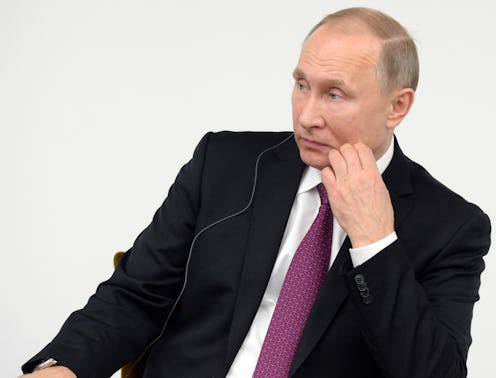News
This Putin "Gay Clown" Image Bugs Him A Lot

Freedom of speech is one of the few areas where even those on the extreme poles of the Left-Right political spectrum usually agree. If the United States has a sacred value, it's that everyone should be free to express their views, especially when it comes to criticizing the government. But for Russian citizens, there are no such guarantees or protections. Witness Russia's latest crackdown, banning a picture that portrays Vladimir Putin as a "possibly gay" clown, crafted to protest the anti-gay policies and agenda coming from the Kremlin.
An American might be forgiven for asking how a picture that lives online can effectively be "banned." Russia's history is a good primer on that very process. Back in 2013, a so-called "Internet Extremism" bill passed Russia's State Duma, which is a legislative-like body of representatives. According to the Moscow Times, the bill allowed for websites to be blocked that were found guilty of "inciting readers to riot, commit 'extremist' or terrorist activities, kindle conflict between nations or religions, or participate in 'mass public events held in violation of the established order.'" Judges were left to their discretion in terms of what websites fit that bill.
In that same year of 2013, Russia also implemented laws that made "propaganda of nontraditional sexual relations" illegal. As Nataliya Vasilyeva and Mansur Mirovalev explained for The Washington Post, the measure was "part of an effort to promote traditional Russian values as opposed to Western liberalism, which the Kremlin and the Russian Orthodox Church see as corrupting Russian youths and contributing to the protests against Putin’s rule."
Non-discrimination against the LGBTQ community is not the only value preached by Western liberalism. In fact, the movement for equal rights has been inextricably bound with freedom of speech, which was not coincidentally a prime co-target of Putin's. The Kremlin has spent the past four years making opposition to Putin in particular and the government in general ever more difficult and dangerous for Russian citizens. Those who stand against Putin are often imprisoned, sometimes beaten, and targeted for smear campaigns. There are several who have wound up dead.
So when the Kremlin threatens online users with prison should they share or even "like" a Putin clown meme labeled as "internet extremism," Russian citizens know that threat is a real one. It doesn't hurt the Russian government's aim that internet censorship — including the complete shut down of entire websites — is a state-sanctioned activity.
Until all that changes, the Kremlin will have cover to ban whatever memes or content it wants.